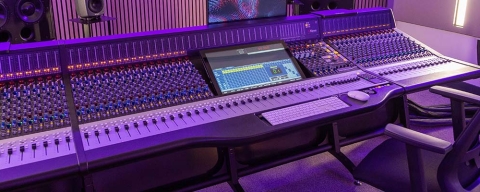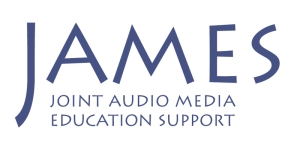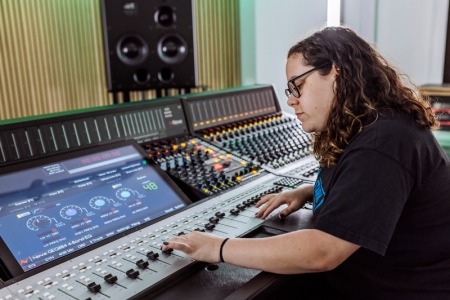
Key information
UCAS code:
W372
Accreditation:
This course is Accredited
Typical offer:
Relevant HE study leading to a Level 5 qualification
Showing content for section Overview
Overview
Our one-year Creative Music Technology top-up course is an exciting customisable opportunity to convert your existing qualification (HND, Foundation or equivalent) into a full Bachelor's degree in music technology.
Mix and match selected modules from our BSc Hons Music Technology degree course to tailor your practice in emerging sound technologies to your interests and career goals. You’ll develop your technical and creative skills with support from an industry-active teaching team from all fields of sound production, including composition, sound design, and music production.
At the end of this course, you’ll be prepared to enter a career in many areas of music technology, such as games and animation, music recording and production, and television and film.
Course highlights
- Specialise in music technology by choosing optional modules you're interested in
- Use professional recording studios with industry-leading equipment and software – including Dolby Atmos and Solid State Logic digital audio workstations – to create music and sound design for entertainment media
- Develop absorbing sound installations and live performances using sensors and alternative controllers
- Enhance your technological knowledge by collaborating with staff and students involved in our futuristic Centre for Creative and Immersive Extended Reality (CCIXR)
- Gain potential accreditations by applying for certifications in Avid Protools and Audiokinetic Wwise
Accreditation

This course is accredited by JAMES (Joint Audio Media Education Services), a group of industry professionals and employers.
The JAMES accreditation lets potential employers know that this course gives you the relevant skills and abilities you need to work in the industry when you graduate. This gives you an edge over students who didn’t do an accredited course when you’re applying for jobs.
JAMES reviews our accreditation every three years to make sure the course content remains up-to-date with industry trends and developments. So you’ll always be learning skills relevant to your career.
Contact information
Contact AdmissionsEntry requirements
BA (Hons) Creative Music Technology (Top-up)
Typical offers
- UCAS points - Relevant HE study leading to a Level 5 qualification, for example, an appropriate HND, foundation degree or Advanced Diploma in Music Technology, Music Production or similar, or 240 credits from year 1 and year 2 of an undergraduate degree (BA/BSc), in a relevant subject.
Applicants without relevant qualifications will be required to provide supplementary information. (calculate your UCAS points)
You may need to have studied specific subjects – find full entry requirements and other qualifications we accept
English language requirements
English language proficiency at a minimum of IELTS band 6.0 with no component score below 5.5.
See alternative English language qualifications
We also accept other standard English tests and qualifications, as long as they meet the minimum requirements of your course.
If you don't meet the English language requirements yet, you can achieve the level you need by successfully completing a pre-sessional English programme before you start your course.
We look at more than just your grades
While we consider your grades when making an offer, we also carefully look at your circumstances and other factors to assess your potential. These include whether you live and work in the region and your personal and family circumstances which we assess using established data.
Facilities

Music and Sound Recording Studios
Our high-end professional music studio complex – completed in Summer 2022 – houses 3 studios, 2 live rooms, editing rooms, and a vocal booth.
Careers and opportunities
Music technology is a continually developing field that's key to the creative industries, so there will be lots of opportunities open to you after the course.
Graduate areas
Previous music technology graduates have gone on to work in areas such as:
- studio recording
- composition
- music production
- acoustics
- sound design for television and film, animation and computer games
- digital media
- education
Graduate roles
Roles our graduates have taken on include:
- audio developer
- music technology lecturer
- musical technician
- studio manager
- studio engineer
- music teacher
- game audio professional (composition and sound design)
- sound designer for visual media
Ongoing careers support
Get experience while you study, with support to find part-time jobs, volunteering opportunities, and work experience. You can also venture into freelancing, or set up and run your own business with help from the University Startup Team.
Towards the end of your degree and for up to five years after graduation, you’ll receive one-to-one support from our Graduate Recruitment Consultancy to help you find your perfect role.
Modules
What you'll study
Core modules
Demonstrating project management and problem-solving skills, through critical analysis and experimentation, you'll produce a body of work that advances knowledge in your discipline.
Communicating scholarly outcomes with impact, you'll demonstrate your knowledge and abilities, drawing together your learning into a compelling self-directed showcase.
This is the culmination of your degree journey - proving your readiness for professional and academic challenges ahead.
Optional modules
The experience provides invaluable insight into industry demands, as you analyse technical processes and creative constraints.
This module offers a chance to build essential skills - critiquing your role, integrating feedback, delivering client goals - for a fulfilling career in music and sound design.
This module provides the freedom to innovate across diverse mediums and genres. You'll write original pieces for instruments and voices, honing advanced techniques like orchestration. Your critical listening will also expand through engaging diverse contemporary styles. By the end, you'll be able to realize your creative ideas as professional-quality scores and recordings. This module provides the space to find and refine your unique musical perspectives.
You’ll learn to use game data like player input, physics, and game states to design reactive soundscapes that adapt as you play. Explore how to create non-linear music and sounds that can be generated on the fly. Pick up industry skills in audio middleware to build systems that can mix and switch sounds dynamically.
Make and produce your own music and sound effects that work well with interactive elements. Use coding to create your own audio plugins. Show off your technical and artistic skills with an interactive audio project in a game engine.
This intense training in a specialised area will give you expertise that game studios really want.
The module also gives you valuable experience in managing projects as you turn your sound ideas into reality. Challenge what’s possible in game audio and let your creativity soar.
Building on your existing skills, you'll take charge of managing complex recording projects from start to finish. Evaluating technical resources and aesthetic choices, you'll produce professional recordings attentive to musical style and context.
This hands-on experience, informed by recording history, empowers you to plan, organise and execute music projects to a professional standard. Hone your expertise to thrive in real-world studio environments.
Analysing works by contemporary and historical practitioners, you'll conceive and create an original installation, composition, or multimedia production incorporating innovative sound techniques.
Presenting the finished project, you'll evaluate and contextualise your creative process and achievement.
This module enables you to create an ambitious sound project while honing your critical thinking.
You'll collaborate with students across creative disciplines, developing music and sound design for their projects using appropriate tools and techniques. With opportunities to work with external clients, you'll manage the end-to-end process like a professional.
Evaluating your creative choices and project management, you'll reflect on how broader contexts and aesthetics inform composition.
This module lets you gain real-world experience while showcasing your talents.
You'll develop complex sound setups using both hardware and software, showing off your high-level musical and technical skills. By thinking critically about your work, you'll see how your synthesis knowledge is improving. The key part of this module is that it helps you put together a collection of innovative audio pieces, proving your skill with modern sound tools.
This training gets you ready for professional roles where you need to use sound synthesis in creative ways.
You’ll apply theories, techniques and technologies enabling sound positioning and movement in space. Using this advanced knowledge, you’ll create aesthetically pleasing spatial audio pieces that transport listeners into vivid soundscapes.
Comparing creative approaches, you’ll hone an artistic appreciation for this medium. By reflecting on the relationship between aims and outcomes, you'll refine your ability to utilise sound spatialisation in achieving desired effects.
Changes to course content
We use the best and most current research and professional practice alongside feedback from our students to make sure course content is relevant to your future career or further studies.
Therefore, course content is revised and regularly reviewed. This may result in changes being made in order to reflect developments in research, learning from practice and changes in policy at both national and local levels.
How you're assessed
The formal assessments you take on this music technology top-up vary according to the modules you choose. They include:
- a portfolio of original compositional works
- design and development of an audio/software project
- oral assessments and presentations
- written assignments including essays
You can get feedback on all practice and formal assessments so you can improve in the future.
You can access all teaching resources on Moodle, our virtual learning environment, from anywhere with a Web connection.
For more about the teaching activities for specific modules, see the module list above.
Teaching
Teaching on this course includes:
- lectures
- seminars
- workshops
- tutorials
During your scheduled teaching sessions, you'll focus on creative practices such as composition, synthesis, music computing and production.
You can also book one-to-one sessions if you feel you need specialist technical support for the music software you'll be using.
How you'll spend your time
A typical week
We recommend you spend at least 37 hours a week studying for your music technology top-up degree. You’ll be in timetabled teaching activities such as lectures and workshops for about 7–9 hours a week. The rest of the time you’ll do independent study such as research, reading, coursework and project work, alone or in a group with others from your course.
Most timetabled teaching takes place during the day, Monday to Friday. You may occasionally need to go to University and course events in the evenings and at weekends. There’s usually no teaching on Wednesday afternoons.
Term dates
The academic year runs from September to June. There are breaks at Christmas and Easter.
Supporting you
The amount of timetabled teaching you'll get on your top-up degree might be slightly less than what you're used to in your previous studies, but you'll also get face-to-face support from teaching and support staff when you need it. These include the following people and services:
Types of support
Your personal tutor helps you make the transition to independent study and gives you academic and personal support throughout your time at university.
You'll have regular contact with your personal tutor in learning activities or scheduled meetings. You can also make an appointment with them if you need extra support.
You'll have help from a team of faculty academic skills tutors. They can help you improve and develop your academic skills and support you in any area of your study.
They can help with:
- improving your academic writing (for example, essays, reports, dissertations)
- delivering presentations (including observing and filming presentations)
- understanding and using assignment feedback
- managing your time and workload
- revision and exam techniques
As well as support from faculty staff and your personal tutor, you can use the University’s Academic Skills Unit (ASK).
ASK provides one-to-one support in areas such as:
- academic writing
- note taking
- time management
- critical thinking
- presentation skills
- referencing
- working in groups
- revision, memory and exam techniques
If you have a disability or need extra support, the Additional Support and Disability Centre (ASDAC) will give you help, support and advice.
Our online Learning Well mini-course will help you plan for managing the challenges of learning and student life, so you can fulfil your potential and have a great student experience.
You can get personal, emotional and mental health support from our Student Wellbeing Service, in person and online. This includes 1–2–1 support as well as courses and workshops that help you better manage stress, anxiety or depression.
If you require extra support because of a disability or additional learning need our specialist team can help you.
They'll help you to
- discuss and agree on reasonable adjustments
- liaise with other University services and facilities, such as the library
- access specialist study skills and strategies tutors, and assistive technology tutors, on a 1-to-1 basis or in groups
- liaise with external services
Library staff are available in person or by email, phone, or online chat to help you make the most of the University’s library resources. You can also request one-to-one appointments and get support from a librarian who specialises in your subject area.
The library is open 24 hours a day, every day, in term time.
If English isn't your first language, you can do one of our English language courses to improve your written and spoken English language skills before starting your degree. Once you're here, you can take part in our free In-Sessional English (ISE) programme to improve your English further.
Course costs and funding
Tuition fees
- UK/Channel Islands and Isle of Man students – £9,250 per year (may be subject to annual increase)
- EU students – £9,250 a year (including Transition Scholarship)
- International students – £16,200 per year (subject to annual increase)
Funding your studies
Find out how to fund your studies, including the scholarships and bursaries you could get. You can also find more about tuition fees and living costs, including what your tuition fees cover.
Applying from outside the UK? Find out about funding options for international students.
Tuition fees terms and conditions
Additional course costs
These course-related costs aren’t included in the tuition fees. So you’ll need to budget for them when you plan your spending.
Costs breakdown
Our accommodation section shows your accommodation options and highlights how much it costs to live in Portsmouth.
You’ll study up to 8 modules a year. You may have to read several recommended books or textbooks for each unit.
You can borrow most of these from the Library. If you buy these, they may cost up to £60 each.
We recommend that you budget £75 a year for photocopying, memory sticks, DVDs and CDs, printing charges, binding and specialist printing.
If your final year includes a major project, there could be cost for transport or accommodation related to your research activities. The amount will depend on the project you choose.
Apply
How to apply
To start this course in 2024, apply through UCAS. You'll need:
- the UCAS course code – W372
- our institution code – P80
If you'd prefer to apply directly, use our online application form.
You can also sign up to an Open Day to:
- Tour our campus, facilities and halls of residence
- Speak with lecturers and chat with our students
- Get information about where to live, how to fund your studies and which clubs and societies to join
If you're new to the application process, read our guide on applying for an undergraduate course.
Applying from outside the UK
As an international student you'll apply using the same process as UK students, but you’ll need to consider a few extra things.
You can get an agent to help with your application. Check your country page for details of agents in your region.
Find out what additional information you need in our international students section.
If you don't meet the English language requirements for this course yet, you can achieve the level you need by successfully completing a pre-sessional English programme before you start your course.
Admissions terms and conditions
When you accept an offer to study at the University of Portsmouth, you also agree to abide by our Student Contract (which includes the University's relevant policies, rules and regulations). You should read and consider these before you apply.
